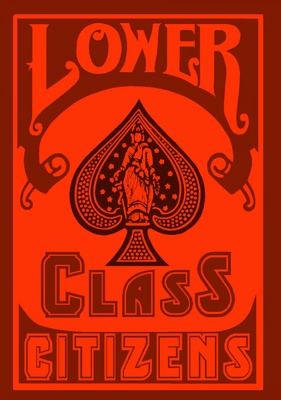 This opinion piece was sent into us by Ray Parrish a member of the Chicago chapter of Vietnam Veterans Against the War (VVAW) and the National Veterans Service Officer for VVAW. The Veterans of VVAW have been recognized both negatively and positively for their pro-Peace and anti-war activities of the Vietnam War that gave birth to the organization, [they got special recognition during the 2004 Presidential election due to the long ago leadership role played by Senator John Kerry for a short time], but what has been ignored is that at the same time that VVAW championed an end to their war, they also were the tip of the spear on the recognition of PTSD and Agent Orange that would eventually be the sources of Vietnam Veteran discontent that Vietnam Veterans of America (VVA) would initially rally behind and still champions today.
This opinion piece was sent into us by Ray Parrish a member of the Chicago chapter of Vietnam Veterans Against the War (VVAW) and the National Veterans Service Officer for VVAW. The Veterans of VVAW have been recognized both negatively and positively for their pro-Peace and anti-war activities of the Vietnam War that gave birth to the organization, [they got special recognition during the 2004 Presidential election due to the long ago leadership role played by Senator John Kerry for a short time], but what has been ignored is that at the same time that VVAW championed an end to their war, they also were the tip of the spear on the recognition of PTSD and Agent Orange that would eventually be the sources of Vietnam Veteran discontent that Vietnam Veterans of America (VVA) would initially rally behind and still champions today.
We want to remind our readers that Veterans and Military Family groups with "Against," "Peace," or "Speak Out" on their logos get a great deal of demonizing, are used by the liberal establishment to stop wars of aggression, but rarely do they get recognized for the humanitarian Veterans advocacy they perform focusing on the battles fought by returning troops of all wars.
I decided to post it, because I’m a member of VVAW, and it compliments my previous articles on the Long and Winding Road that is the broken VA Claims system. What really amazed me about this is that Ray wrote this opinion piece way back in the Summer of 2002 even before we invaded and occupied Iraq. He was among the few with a crystal ball, well really lessons learned by the Vietnam Veterans Movement to project how our youngest generation of Veterans from Iraq and Afghanistan would be treated and why. Regardless which VSO Ray represents, and VVAW is a VSO though not chartered by Congress [more the better], what Ray said back in 2002 has come to pass, but who’s really surprised that learned lessons from the Vietnam Veterans movement.
Robert L. Hanafin
Major, U.S. Air Force-Retired
Veterans Advocacy Editor
VT News Network &
Our Troops News Ladder
Member, Vietnam Veterans Against the War (VVAW)
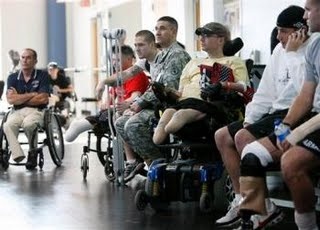 The Veteran as Second Class Citizen By Veteran Service Officer Raymond Parrish
The Veteran as Second Class Citizen By Veteran Service Officer Raymond Parrish
The sacrifices of countless veterans built this once prosperous society, but many veterans feel that they are second class citizens because of the failure of the laws and agencies that were established in response to disability claims and complaints of abuse. Now, I have to offer what proof I have to explain our feeling that we have been betrayed by our own people, government and veterans’ organizations. We feel that we have been used up and discarded for financial or political reasons.
During my eighteen years as a military dependent ("brat"), four years of active duty and twenty-five years as a veterans’ counselor, I have seen three generations of American veterans come and go. I have been called upon by my fellow veterans to bear witness to the seeming indifference of government bureaucrats, politicians and their neighbors to the problems resulting from their military experience. More than anything else, I am the messenger and the facts that I present will speak for themselves.
Veterans and their families are treated as second-class citizens under the current laws when they are condemned to ineffective legal representation and remedies in disability claims. As GIs, we leave behind families and comfort and risk lives and sanity. At last we come home as veterans, but to a society which seems to be unable to deal with our problems and us.
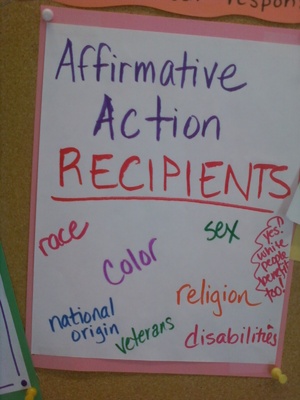 You brainwash us with songs and stories of glory and send us to die alone in a jungle or the desert or by the thousands on a beach or a hilltop, and we do what we are asked with grim determination and pride. We fight and die to protect the freedoms that you enjoy and upon which our nation was founded, and then we give them up for the sake of military discipline. You march us through radioactive fallout in atomic bomb tests, Agent Orange in Vietnam, oil well fires, chemical weapons and experimental counter-weapons in the Persian Gulf. When we return you call us baby killers. You don’t allow your daughters to date us and feel fear or suspicion when you see us. You put our exploits on TV to get the new cannon fodder and then ignore us.
You brainwash us with songs and stories of glory and send us to die alone in a jungle or the desert or by the thousands on a beach or a hilltop, and we do what we are asked with grim determination and pride. We fight and die to protect the freedoms that you enjoy and upon which our nation was founded, and then we give them up for the sake of military discipline. You march us through radioactive fallout in atomic bomb tests, Agent Orange in Vietnam, oil well fires, chemical weapons and experimental counter-weapons in the Persian Gulf. When we return you call us baby killers. You don’t allow your daughters to date us and feel fear or suspicion when you see us. You put our exploits on TV to get the new cannon fodder and then ignore us.
Don’t you know that this is all true, no matter how good the parades and speeches make us feel for a little while? Don’t you know how it must make us feel? Don’t you know that what has happened to us since our return, what you have done to us, is just as devastating as the war that we fought for you? Don’t you see that this neglect proves to us that our mere existence is a continued embarrassment to our own country? Don’t you know that "better off dead" is merely a thought to many of us, but the last words for far too many of us? Don’t you know that even if all of this was done without malice, it doesn’t change what has happened or how we see ourselves? Don’t you know that you have made us see ourselves as less than nothing, as less than lower class citizens?
I apologize for using the word lower class, and I promise that you won’t see it here again for it rings of "low life." However, low life is the only words that even hints at the depth of the emotions involved. I have seen too many of us lose patience and hope. It is that deafening scream of the unsatisfied dead ringing in my ears that cannot be drowned out by anything less. I am willing to deal with any criticism because, whatever the cost, it’s a small price to pay to focus the public’s attention on this issue, and I could do no less for my comrades.
G. I. Blues
Before addressing the legal and bureaucratic causes of veterans’ complaints, it’s necessary to understand the resulting veterans’ sense of betrayal. We need to understand why so many veterans say that the VA is just waiting for them to die or that certain VA personnel are criminals who should be jailed or worse.
The veterans we are talking about are, by definition, survivors, with all that implies. This is especially true of combat veterans, whose problems may be more severe than those of their non-combat comrades. Although many combat veterans have successfully dealt with their problems, some can even write about them in novels that glorify war, but many others conceal their emotions and their past and are able to pass as "normal" civilians.
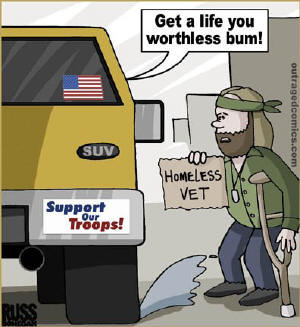
We are dealing with matters of perception: how veterans remember their military experiences and how they see themselves in that light. How veterans think they are seen by society is based upon the way their neighbors, politicians or VA bureaucrats treat them. Because they misinterpreted your behavior, how veterans think they are seen by you may not be the same way you actually see them. Or your inaccurate perceptions resulted in behavior which caused inappropriate perceptions and behaviors in veterans.
Post-Traumatic Stress Disorder (PTSD) is the psychological term that is most often used to describe a wide variety of emotions and behaviors that afflict combat veterans or victims of abuse, assault or natural disasters. Very few of these survivors come away unscathed. The traumatic experience may provoke a psychotic episode or a complete mental breakdown. It can create lifelong depression or anxiety. It can accentuate a minor pre-existing mental disorder into a chronic and completely disabling illness. These things can happen immediately or decades later.
Veterans who watched their comrades’ die may be suffering from the classic "survivor guilt." They may think that they could have prevented those deaths somehow or that the mere fact that they are alive is evidence of cowardice. They may think that their survival or their friends’ deaths can be justified only by their own success, so any shortcoming or failure is amplified and seen as a betrayal of their fallen comrades.
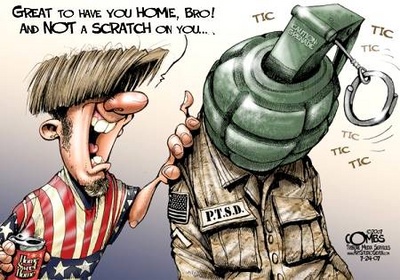 Many veterans are bothered by what they did in order to survive or to insure the survival of their comrades. Many are full of regret and shame because of the cruelties that they inflicted upon innocent civilians. They participate in reconciliation programs designed to help former enemies rebuild battle-torn areas and clear minefields. Some excuse past behavior by embracing anti-communism, patriotism or racism. Some are unable to sleep well no matter how many times they recite the "I was only following orders" mantra, even if it’s true.
Many veterans are bothered by what they did in order to survive or to insure the survival of their comrades. Many are full of regret and shame because of the cruelties that they inflicted upon innocent civilians. They participate in reconciliation programs designed to help former enemies rebuild battle-torn areas and clear minefields. Some excuse past behavior by embracing anti-communism, patriotism or racism. Some are unable to sleep well no matter how many times they recite the "I was only following orders" mantra, even if it’s true.
Sights, sounds or smells may trigger disturbing memories. For some, the war is never over. When you see a veteran with the so-called "thousand-yard stare," try to remember that he is seeing the faces of the dead and try not to laugh at those who duck when a car backfires. Many veterans turn vegetarian or avoid barbecues because the smell of burning flesh reminds them of a horrific experience with napalm or phosphorous weapons. Similar reasons may cause them to avoid any Asian food or recoil at Asian faces or language. Those who have seen needless deaths because of the mistakes of others have a hard time trusting anyone in authority. They can’t keep jobs unless they are in charge or have an understanding boss, most often a fellow veteran.
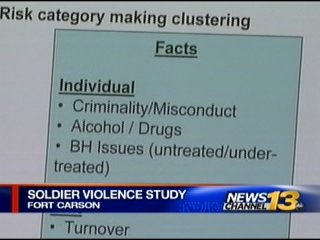 Those few veterans who get public attention are the ones whose extreme behavior brings on headlines and stiff prison sentences. Other veterans see this as "the squeaky wheel gets oiled," and copy the behavior. They are desperate to have someone listen to their complaints and have their "day in court." Few of them imagine, however, that it would be them rather than the government on trial that day.
Those few veterans who get public attention are the ones whose extreme behavior brings on headlines and stiff prison sentences. Other veterans see this as "the squeaky wheel gets oiled," and copy the behavior. They are desperate to have someone listen to their complaints and have their "day in court." Few of them imagine, however, that it would be them rather than the government on trial that day.
The VA points to statistics that show that most claims are decided speedily and correctly and that most VA employees are honest and hardworking. But many legitimate claims are delayed or denied at the local level and are then overturned after years of appeals. Veterans see this as proof that the denials were illegal and demand disciplinary or criminal actions against those whose decisions were reversed. The VA simply sees these as mistakes and will do no more than say, "Oops, sorry." Veterans see this as the arrogance of those who think that they are above the law. This perceived lack of accountability outrages veterans.
I have had to talk insanely irate victims of this abuse out of violence against the VA employees who denied or delayed their disability claims. The threats were, in reality, just hot air, but I could swear that I sometimes saw steam coming out of their ears as they were ranting. Then I have to talk to veterans who were made homeless and hopeless by such VA actions into continuing to fight to live. Many veterans just give up because they no longer feel that society appreciates their sacrifices and have now come to see themselves as nothing more than a burden to society. They won’t rob anyone because they would rather die than use violence to survive and their personal honor is the only thing they have left.
Some are angered when they see their battlefield heroics exploited to attract cannon fodder for the politicians’ latest war or guinea pigs for the nuclear or chemical industries. When they wake up from nightmares of blood combat, veterans can no longer take comfort in the thought that the deaths that they witnessed or caused were worth the cost or justified by anything more than survival. I have seen veterans lose hope and try to kill themselves using drugs, fast cars or police return-fire to do it. Many try to kill perceived enemies, strangers or their own poverty-stricken families. Many succeed.
The Legal Minefield
Before you dismiss or trivialize these problems, allow me a chance to persuade you how serious this problem is for us as a nation. While we all see media stories on veterans’ problems regularly, only a fraction of the complaints are reported. There is no TV or radio show devoted to this issue. Statistically, veterans are more likely to be unemployed, be homeless, have a serious mental illness, or sue the U.S. government. To understand why this is so, you need to understand the system of complex VA rules, U.S. court decisions, and efforts of veterans’ groups and the reality of how it all works.
 Two things have set the limits of the legal remedies available to veterans. First, the concept of "sovereign immunity" basically means that the U.S. government decides who can sue it. Many veterans feel that the government has misused this to protect private companies operating under government contract. Then, the U.S. Supreme Court decision in Feres vs. U.S. prohibits veterans from suing the government. To make up for this, Congress passed laws that were supposed to insure that the VA disability system is "friendly and non-adversarial." That’s not the reality that we live and die with.
Two things have set the limits of the legal remedies available to veterans. First, the concept of "sovereign immunity" basically means that the U.S. government decides who can sue it. Many veterans feel that the government has misused this to protect private companies operating under government contract. Then, the U.S. Supreme Court decision in Feres vs. U.S. prohibits veterans from suing the government. To make up for this, Congress passed laws that were supposed to insure that the VA disability system is "friendly and non-adversarial." That’s not the reality that we live and die with.
Most veterans’ complaints concern the military’s refusal to change discharges and VA denials that their disability is "service-connected" or that their disabilities make them totally disabled. Most of these denials say that not enough evidence to prove the claim was submitted. Veterans disagree not only with the conclusion but also with the process. Winning these claims can be very significant when it comes to getting medical care, compensation or benefits. A totally disabled veteran, if the disability is considered 100% service-connected, the veteran gets a little over $2000 per month. The disability compensation is based on ratings from a low of 10% to severity of 100%. VA Pensions are needs based.
Although it often takes longer, the Chicago VA Regional Office (VARO) says that, with their backlog of claims, it takes them ninety days to make a decision once evidence is submitted, which may take years to find. If a VARO denies a claim you can appeal to the Board of Veterans’ Appeals (BVA). The BVA now says that it will take those eighteen months to work through their backlog and make a decision. Until recently, appeals to the BVA took five years. Until 1988, BVA denials could be appealed in the U.S. Court of Appeals, but only if you got a lawyer.
After years of complaints and hearings, Congress acknowledged that claimants for VA benefits are in an "adversarial" relationship with the VA and created the U.S. Court of Appeals for Veterans Claims (CAVC) in 1988. This is the only U.S. Court where appellants aren’t required to have a lawyer. Over half of these appeals are begun without representation, but enough find lawyers so that less than half are unrepresented by the time that the CAVC makes a decision. Even though most claims without representation lose at the CAVC, enough unrepresented veterans win, so other veterans are encouraged to appeal without legal representation.
Recent law has changed to allow Veterans access to attorneys, but lawyers certified by the VA are few in number and hard to find. That is because up until 2007, lawyers could only be paid no more than $10 to represent claimants for VA benefits, under a 19th century law passed to protect Civil War veterans from unscrupulous lawyers. This limit is lifted if the case is appealed in the CAVC, and lawyers can get a percentage, but only 15%, rather than the usual 33% for non-VA claims such as Social Security. But new evidence, which is often necessary to win the claim, cannot be added to the case at that point. So veterans have to pay lawyers to be told that they can’t win, or they can readily find lawyers who are glad to take a percentage of easy wins.
Veteran service organizations, such as the American Legion, have veteran service officers (VSOs) who provide free, non-attorney representation. This is supposed to insure that veterans get representation equal to that which lawyers would provide, but training and competence varies, and the only cases they take to the CAVC are those that set precedents. In addition, all states have their own Department of Veterans Affairs, and many counties have veterans’ service commissions, with service officers who help veterans with complex rules and paperwork, but many don’t represent veterans at the VA.
These agencies are organized and work together in a variety of ways. The American Legion, like some national groups, gives the responsibility for hiring VSOs to their state affiliates. Some national veterans’ groups, most notably the Disabled American Veterans, retain control of their VSOs at the national level. As a way of assisting these groups, some states pay the salaries of the VSOs accredited by national groups and working in the VAROs representing veterans and writing appeals.
The Illinois Department of Veterans’ Affairs (IDVA), for example, maintains a statewide system of field offices to help veterans with VA paperwork and procedures, but doesn’t represent veterans at the VA. Most of the counties have a veterans’ commission which employs a service officer for the same purpose and with the same restrictions. The IDVA supports those VSOs who represent veterans by paying the salary (with state employee benefits) of a VSO in each of the big national groups’ offices at the Chicago VA regional offices. The only exception is the American Legion – it appears that the state doesn’t trust the Legion to do this work.
With that in mind, I can now bring up the fact, without it sounding entirely like sour grapes, that the VA had the American Legion fire me, one of their own veteran service officers (VSOs), for complaining too much. The VA said that my memos to them on behalf of veterans were too "antagonistic." The facts surrounding this and the American Legion’s personnel file used for my termination are what I am now making public as evidence that these problems have reached a crisis.
[That was 2002, and now it is 2009, is the VA system still in crisis? How many Veterans Service Organization Service Officers are willing to place your job on the line by well "complaining too much" about how America’s Veterans are mistreated. Damn, we thought that was your job? Major Hanafin.]
The Bureaucratic Snake pit
Even when the law and evidence supports a veteran’s claim, it can be denied or delayed by some nameless bureaucrat at the VARO, we VSOs working there are supposed to prevent that from happening or get it reversed if it happens. In order to ensure that the VA handles all claims correctly, we are given direct access to the veteran’s claim files and the VARO personnel making the decisions. During my time at the Chicago VARO I saw so many bad decisions and dealt with VA personnel that were so out of touch with reality that I must conclude that they are simply crazy.
Every day, some VA employee complains about a Service Officer because of the very nature of our jobs. [It makes no difference if you are a Service Officer for the Legion, VFW, or some VSO with "Against," "Peace," or "Speak Out" in your logo. Major Hanafin]
Called GIs – that is, Government Issue – how can we help but see ourselves as property as low lifes, well putting it politely lower class, nothing more than slaves?
Ray Parrish is a member of the Chicago chapter of VVAW.
Readers are more than welcome to use the articles I’ve posted on Veterans Today, I’ve had to take a break from VT as Veterans Issues and Peace Activism Editor and staff writer due to personal medical reasons in our military family that take away too much time needed to properly express future stories or respond to readers in a timely manner.
My association with VT since its founding in 2004 has been a very rewarding experience for me.
Retired from both the Air Force and Civil Service. Went in the regular Army at 17 during Vietnam (1968), stayed in the Army Reserve to complete my eight year commitment in 1976. Served in Air Defense Artillery, and a Mechanized Infantry Division (4MID) at Fort Carson, Co. Used the GI Bill to go to college, worked full time at the VA, and non-scholarship Air Force 2-Year ROTC program for prior service military. Commissioned in the Air Force in 1977. Served as a Military Intelligence Officer from 1977 to 1994. Upon retirement I entered retail drugstore management training with Safeway Drugs Stores in California. Retail Sales Management was not my cup of tea, so I applied my former U.S. Civil Service status with the VA to get my foot in the door at the Justice Department, and later Department of the Navy retiring with disability from the Civil Service in 2000.
I’ve been with Veterans Today since the site originated. I’m now on the Editorial Board. I was also on the Editorial Board of Our Troops News Ladder another progressive leaning Veterans and Military Family news clearing house.
I remain married for over 45 years. I am both a Vietnam Era and Gulf War Veteran. I served on Okinawa and Fort Carson, Colorado during Vietnam and in the Office of the Air Force Inspector General at Norton AFB, CA during Desert Storm. I retired from the Air Force in 1994 having worked on the Air Staff and Defense Intelligence Agency at the Pentagon.
ATTENTION READERS
We See The World From All Sides and Want YOU To Be Fully InformedIn fact, intentional disinformation is a disgraceful scourge in media today. So to assuage any possible errant incorrect information posted herein, we strongly encourage you to seek corroboration from other non-VT sources before forming an educated opinion.
About VT - Policies & Disclosures - Comment Policy



